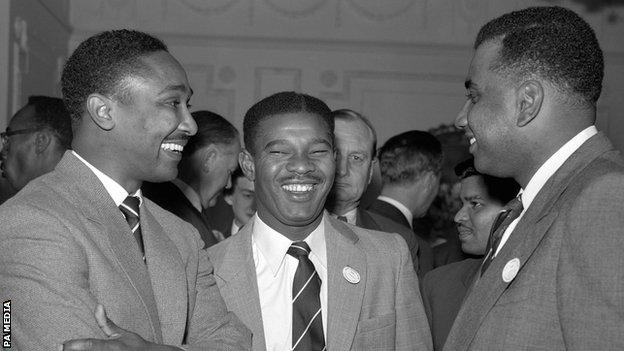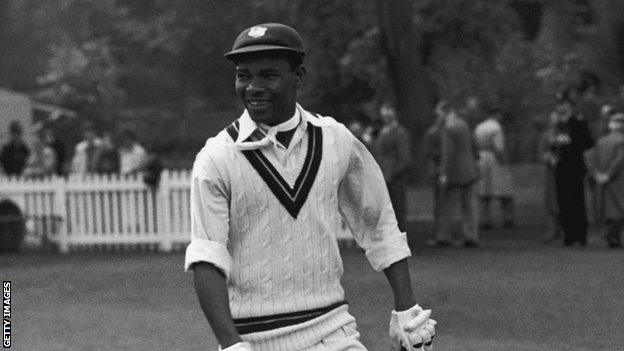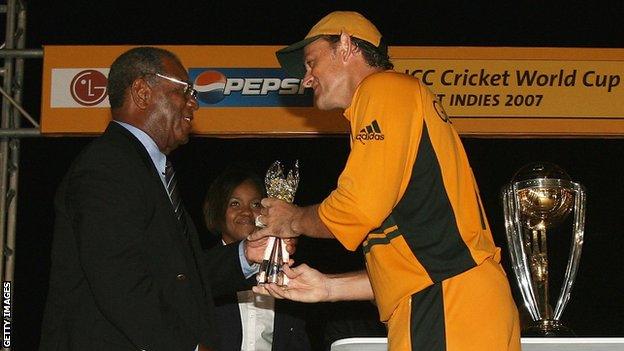Obituary: Sir Everton Weekes - a West Indies legend
- Published

Frank Worrell, Everton Weekes and Clyde Walcott - the 'Three W's' - were part of a legendary West Indies team
Sir Everton Weekes was the last survivor of the famous 'Three Ws' - a trio of West Indies batting legends whose lives and careers became irrevocably entwined.
Frank Worrell, Everton Weekes and Clyde Walcott were all born within 18 months, and within three miles of each other in Barbados - and were even delivered by the same midwife.
All three made their debuts in early 1948 against England, were the middle-order mainstays of the great West Indies side of the 1950s - and were all subsequently knighted for services to cricket.
A record run of centuries
Everton DeCourcy Weekes was born on 26 February 1925, named after the famous Merseyside football team of which his father was an avid supporter.
According to legend, England spinner Jim Laker once remarked to Weekes: "It's a good job that he wasn't a fan of West Bromwich Albion."
Born in poverty, Weekes left school at 14 and served in the Barbados Defence Force. He appeared in 10 first-class games for Barbados before being called up to face England at Kensington Oval in his home town, Bridgetown, a month before his 23rd birthday.
A first Test century came in the final game of that series in Jamaica, the start of an unparalleled purple patch of form for Weekes, a stocky, powerful right-hander.
Touring India later that year, he struck centuries in Delhi, Bombay and two in Calcutta, to complete a run of five successive Test hundreds, a feat not matched before or since.
He was even controversially run out for 90 in the fourth Test in Madras while chasing a sixth ton. He did pass 1,000 Test runs though, in only his 12th innings, another record - jointly held with Herbert Sutcliffe, external - that still stands.
That form earned Weekes an offer to play in the Lancashire League, where he was a much-loved professional for Bacup for seven seasons, averaging more than 90.
The Three Ws and the heroes of 1950

Weekes' run of seven consecutive Test scores of 50 or more has only been matched by Andy Flower, Shivnarine Chanderpaul and Kumar Sangakkara
West Indies had never won a Test on English soil on three previous tours before they arrived in 1950, two years after the Windrush brought hundreds of Caribbean migrants to the UK.
But after losing the first Test at Manchester, where Worrell, Weekes and Walcott batted at three, four and five respectively for the first time, West Indies bounced back superbly to take the series 3-1 with three spectacular victories.
The Three Ws, as they were dubbed on that tour, became household names, while Weekes also helped himself to four double centuries against county sides and a triple ton against Cambridge University.
Weekes and Worrell were named among Wisden's five cricketers of the year in 1951, as were spinners Sonny Ramadhin and Alf Valentine who took 59 wickets between them.
Despite injury problems for Weekes in the years that followed, he hit double centuries against India and England, both in Trinidad, and three back-to-back hundreds in New Zealand in 1956.
A thigh injury prompted his international retirement in 1958, aged only 33, just as the great all-rounder Garry Sobers was making his mark - and two years before Worrell became West Indies' first black captain.
Coach, commentator, bridge player, knight

Weekes presents Australia's Adam Gilchrist with the man-of-the-match award at the 2007 World Cup final in Barbados
Although retired from Tests, Weekes played for Barbados until 1964. He coached Canada at the 1979 World Cup and served on the Barbados Cricket Association board.
A popular voice in the commentary box and briefly an International Cricket Council (ICC) match referee, Weekes also represented Barbados at contract bridge and remained close to Worrell and Walcott, becoming the last of the trio to be knighted in 1995.
A first-class cricket ground on the edge of Barbados is named the Three Ws Oval, and Worrell and Walcott are both buried overlooking it, while a stand at Kensington Oval also bears their names.
Worrell died aged 42 in 1967 after suffering with leukaemia, while Walcott, who later managed the West Indies team and served as ICC chairman, died in 2006.
That left Weekes as the genial elder statesman of West Indies cricket, regularly attending games until well into his 90s.
In 2019 he said:, external "I'm 93, and my doctor has only just told me to stop swimming in the sea every day." He suffered a heart attack later that year.
At the time of his death he was the third oldest surviving male Test cricketer.
Weekes' son David Murray kept wicket for West Indies in 19 Tests and 10 one-day internationals between 1973 and 1982, before receiving a life ban for joining a rebel tour of apartheid South Africa.